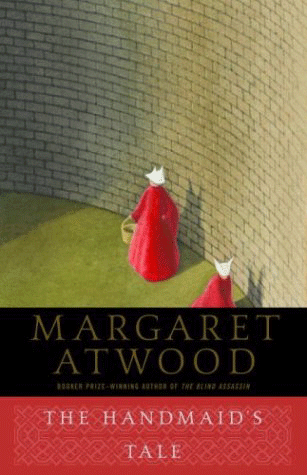Margaret Atwood predicts a radical new world in The Handmaid’s Tale

October 1, 2017
This novel surprised me a great deal. I went into this expecting a lot from Atwood, based on the hype of both the novel, and now the Hulu series (which just won 5 Emmy awards), though I haven’t watched that yet. Mostly, I was expecting a classic revolutionary story where the protagonist fights back against the establishment in the foreseeable future, which ultimately falls. However, this novel was nothing like I thought it would be.
The Handmaid’s Tale takes place in future America, the Republic of Gilead, where women are seen as objects to a means. In this instance, after the previous war, the radiation affected the public’s sterilization, causing birth rates to plummet, along with an increase in miscarriages, deformation, and stillbirths. Slowly, the supposed democracy segued into a totalitarian regime where the possession of what was called Handmaids was commonplace in a wealthy household. The job of these Handmaids was simply to reproduce, to carry the children that the Wives could no longer have. Our narrator, Offred, is one of these Handmaids and tells her story through beautiful prose that entices anyone who reads this novel.
One of my favorite things about The Handmaid’s Tale was the writing, which was full of both details and ambiguity; detailed enough to get a full picture of the surroundings, but ambiguous enough to leave the reader with questions after each chapter. One thing that I noted in every single chapter was the vivid imagery. The descriptions weren’t so over explained that they made me want to skip whole paragraphs, but set up as multiple fragments that set the scene, which I thought was more effective in terms of setting and surroundings.
There are two reasons why this novel is so relevant and popular today. One of them is the same reason why 1984 came back to the bestsellers list in 2017 because the recent U.S. presidential election: fear. The Republic of Gilead is no less horrifying than the country of Oceania, nor vice versa, though it seems worse from a feminist lens. This leads us to the second point, which is the fight for equality. Gilead wants everyone to think that they’re equal, that they have a say, and that they’re just doing their duty to humanity, where in fact no one does. Every class is held up to a certain expectation, and if one person breaks this expectation, he or she is deemed unfit for society, removed, and promptly replaced.
That’s the thing about Gilead: they don’t care about the individual. Instead, they think of the whole. Every single person in this society is replaceable (to an extent) until the goal is achieved. Obviously, there are not an infinite number of people to do the replacing, as that’s the point of the Handmaids. However, in Offred’s situation, as her job is to have a child, they will keep going through Handmaids to get it.
This makes Offred’s story that much more enticing. Seeing the situation of the former America through the mind of an individual indicates the gravity of the solitude. One of her main internal struggles throughout the story occurs as she remembers her old life with her husband and daughter, and how it all got slowly ripped away from her. What also makes the story more relatable to readers is the fact that she doesn’t fight back. There are always stories about strong heroines who break down the establishment, but not everyone is brave or has that power. This story is told from the point of view of someone who wants and has hope, but lacks the internal strength to fight back.
This story did not come together in the end or wrap up nicely with a bow on top. I won’t spoil the ending because I believe that everyone should read this book if you’re a fan of dystopian fiction, but the end is what made this review four stars. The story moves at a steady pace and keeps you entertained throughout. I will say that this book is not intended for young adult readers, as it can be graphic at some parts.
Many people have asked if this story is a prediction on Atwood’s part, but I believe that nothing this radical could happen in the near future. The premise of this tale is a warning for all of us to not let our world get to this point.


